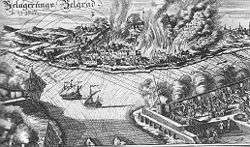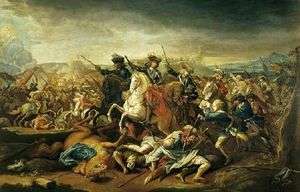Prinz Eugen, der edle Ritter



Prinz Eugen, der edle Ritter (Prince Eugene, the Noble Knight) is a German folksong about the victory of Prince Eugene of Savoy in 1717 during the Austro-Turkish War of 1716–1718.
Theme
The song is a narrative of the Siege of Belgrade. The text diverts from historical accuracy in two aspects. The day of the final assault on the defenders is given as the 21st of August although it was the 16th of August. Second, the song tells of the death of one of Eugene's brothers named Louis (Prinz Ludewig). Eugene had two brothers named Louis but none of them fell at Belgrade. The younger one, Louis Julius (1660-1683) who had entered Imperial service prior to Eugene was killed by Crimean Tatars at Petronell, whereas the older one, Louis Thomas (1657-1702) had died at the Siege of Landau.
Background and legacy
The author of the song is unknown. The melody derives from "Als Chursachsen das vernommen" and has later been adopted also to Ob wir rote, gelbe Kragen. Among others, Josef Strauss (Op. 186) has later composed his Prinz Eugen march based on the folksong.
Text
| Prinz Eugen, der edle Ritter |
|---|
| First stanza |
|
Prinz Eugen der edle Ritter, |
| Second stanza |
|
Als die Brucken nun war geschlagen, |
| Third stanza |
|
Am einundzwanzigsten August soeben |
| Fourth stanza |
|
Als Prinz Eugenius dies vernommen, |
| Fifth stanza |
|
Bei der Parol' tät er befehlen, |
| Sixth stanza |
|
Alles saß auch gleich zu Pferde, |
| Seventh stanza |
|
Ihr Konstabler auf der Schanzen, |
| Eighth stanza |
|
Prinz Eugenius auf der Rechten |
| Ninth stanza |
|
Prinz Ludewig, der mußt' aufgeben |